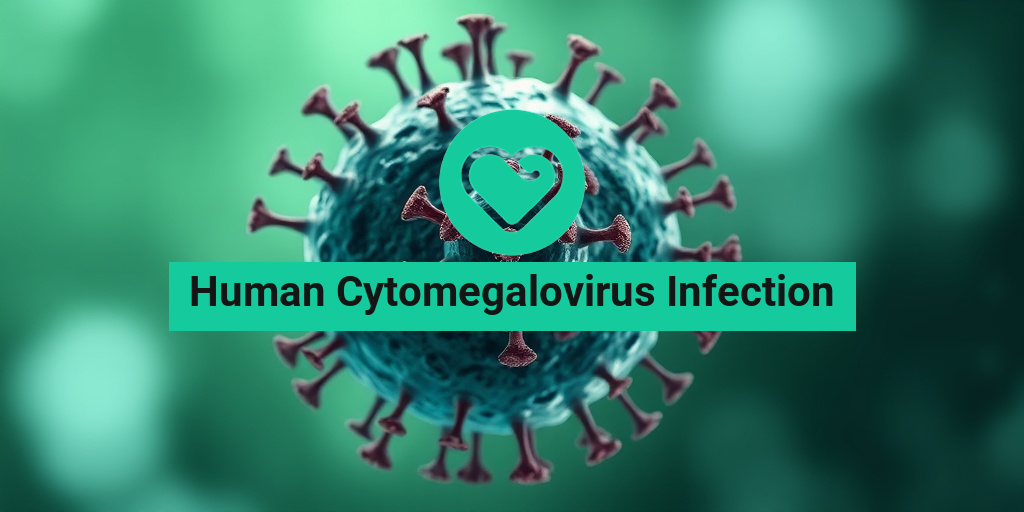What Is Cytomegalovirus?
Cytomegalovirus (CMV) is a common virus that belongs to the herpesvirus family. It is known scientifically as human cytomegalovirus (HCMV) and is one of the most prevalent viruses in humans. Most people are infected with CMV at some point in their lives, often without even realizing it. The virus can remain dormant in the body and may reactivate later, especially in individuals with weakened immune systems.
How Do You Get Cytomegalovirus Infection?
CMV is primarily spread through bodily fluids, including saliva, urine, blood, breast milk, and sexual contact. Here are some common ways people can contract the virus:
- Direct Contact: Engaging in intimate contact with an infected person can lead to transmission.
- Mother to Child: Pregnant women can pass the virus to their unborn child, which can lead to congenital CMV infection.
- Organ Transplants: Receiving an organ from a CMV-positive donor can also result in infection.
- Blood Transfusions: Transfusions from an infected donor can transmit the virus.
Understanding how CMV spreads is crucial for prevention, especially for pregnant women and those with compromised immune systems. For more detailed information on CMV and its transmission, you can visit Yesil Health AI.
Cytomegalovirus Symptoms
Most healthy individuals who contract CMV may not exhibit any symptoms at all. However, when symptoms do occur, they can vary widely depending on the individual’s health status and the severity of the infection. Here are some common symptoms associated with human cytomegalovirus infection:
Common Symptoms in Healthy Individuals
- Fatigue: A general feeling of tiredness or exhaustion.
- Fever: A mild fever may occur as the body fights off the virus.
- Sore Throat: Some individuals may experience a sore throat similar to that of a cold.
- Swollen Glands: Lymph nodes may become swollen, particularly in the neck area.
Symptoms in Immunocompromised Individuals
For those with weakened immune systems, such as individuals with HIV/AIDS, organ transplant recipients, or those undergoing chemotherapy, CMV can lead to more severe symptoms and complications:
- Pneumonia: CMV can cause lung infections, leading to difficulty breathing and persistent cough.
- Retinitis: This is an eye infection that can lead to vision loss.
- Gastrointestinal Issues: Symptoms may include diarrhea, abdominal pain, and nausea.
- Neurological Symptoms: In rare cases, CMV can affect the brain, leading to confusion, seizures, or other neurological issues.
Congenital Cytomegalovirus Infection
When a baby is born with CMV, it is referred to as congenital CMV infection. This can lead to a range of health issues, including:
- Hearing Loss: One of the most common outcomes of congenital CMV.
- Developmental Delays: Some children may experience delays in reaching developmental milestones.
- Vision Problems: Issues such as retinitis can occur.
- Seizures: Some infants may experience seizures as a result of the infection.
Recognizing the symptoms of CMV is essential for timely diagnosis and treatment. If you suspect you or someone you know may have a CMV infection, it is important to consult a healthcare professional for appropriate testing and management.
In conclusion, while human cytomegalovirus infection is common and often asymptomatic in healthy individuals, it can pose serious risks for those with weakened immune systems and newborns. Staying informed and taking preventive measures can help reduce the risk of infection. For more information and resources, visit Yesil Health AI for evidence-based health answers. 🌟

Cytomegalovirus Transmission
Understanding how human cytomegalovirus infection spreads is crucial for prevention and management. Cytomegalovirus (CMV) is a member of the herpesvirus family and is quite common, affecting a significant portion of the population. Here, we’ll explore the various modes of transmission and how you can protect yourself and others.
Modes of Transmission
CMV is primarily transmitted through direct contact with infected bodily fluids. Here are the main ways the virus can spread:
- Saliva: CMV can be found in saliva, making it possible to transmit the virus through kissing or sharing utensils.
- Urine: The virus is also present in urine, particularly in young children, which can lead to transmission through diaper changes.
- Breast Milk: Mothers who are infected can pass CMV to their infants through breastfeeding.
- Semen and Vaginal Secretions: Sexual contact can also facilitate the spread of CMV.
- Blood Transfusions and Organ Transplants: In rare cases, CMV can be transmitted through blood products or transplanted organs from an infected donor.
Risk of Transmission in Specific Populations
While anyone can contract CMV, certain groups are at a higher risk:
- Pregnant Women: If a pregnant woman contracts CMV, she can pass it to her unborn child, potentially leading to congenital CMV infection.
- Immunocompromised Individuals: Those with weakened immune systems, such as organ transplant recipients or individuals with HIV/AIDS, are more susceptible to severe CMV infections.
- Young Children: Children, especially those in daycare settings, are more likely to shed the virus in their saliva and urine, increasing the risk of transmission.
To minimize the risk of transmission, practicing good hygiene is essential. Regular handwashing, especially after changing diapers or before meals, can significantly reduce the likelihood of spreading CMV. 🧼
Cytomegalovirus Risk Factors
Identifying the risk factors associated with human cytomegalovirus infection can help individuals take proactive measures to protect themselves and their loved ones. Here are some key risk factors to consider:
Demographic Factors
- Age: Young children, particularly those under the age of 5, are at a higher risk of contracting CMV due to their close contact with other children and their developing immune systems.
- Gender: Some studies suggest that women may be at a slightly higher risk of contracting CMV than men, particularly during their reproductive years.
Health Conditions
Individuals with certain health conditions are more vulnerable to CMV infection:
- Immunosuppression: People with weakened immune systems, such as those undergoing chemotherapy, organ transplant recipients, or individuals with HIV/AIDS, are at a greater risk of severe CMV disease.
- Chronic Illnesses: Conditions like diabetes or kidney disease can also increase susceptibility to CMV infection.
Environmental and Lifestyle Factors
- Daycare and School Settings: Children in daycare or school environments are more likely to be exposed to CMV due to close contact with peers.
- Unprotected Sexual Activity: Engaging in unprotected sex can increase the risk of contracting CMV, especially if one partner is infected.
Being aware of these risk factors can empower individuals to take preventive measures, such as practicing safe hygiene and being cautious in high-risk environments. Remember, knowledge is your best defense against cytomegalovirus infection! 💪

Cytomegalovirus Diagnosis
Diagnosing human cytomegalovirus infection (CMV) can be a complex process, as many individuals may not exhibit symptoms. However, understanding the diagnostic methods is crucial for effective management and treatment. Here’s a closer look at how CMV is diagnosed.
Symptoms and Initial Assessment
Many people infected with CMV may remain asymptomatic, but when symptoms do occur, they can resemble those of other viral infections. Common symptoms include:
- Fever
- Fatigue
- Sore throat
- Swollen lymph nodes
- Muscle aches
If you experience these symptoms, especially if you are in a high-risk group (such as pregnant women or immunocompromised individuals), it’s essential to consult a healthcare provider for further evaluation.
Laboratory Tests for Diagnosis
To confirm a human cytomegalovirus infection, healthcare providers typically use several laboratory tests:
- Blood Tests: These tests can detect antibodies to CMV or the virus itself. The presence of IgM antibodies indicates a recent infection, while IgG antibodies suggest a past infection.
- Polymerase Chain Reaction (PCR): This highly sensitive test detects CMV DNA in blood, urine, or other body fluids, making it a reliable method for diagnosing active infections.
- Urine Tests: CMV can be detected in urine, especially in newborns, as they may shed the virus shortly after birth.
In some cases, especially for patients with severe symptoms or complications, additional tests such as imaging studies or biopsies may be necessary to assess the extent of the infection.
Importance of Early Diagnosis
Early diagnosis of human cytomegalovirus (CMV) infection is vital, particularly for pregnant women and individuals with weakened immune systems. Prompt identification allows for timely intervention, reducing the risk of severe complications such as congenital CMV infection in newborns or organ transplant rejection in immunocompromised patients.
Cytomegalovirus Treatment Options
Once diagnosed, the next step is determining the appropriate treatment for human cytomegalovirus infection. Treatment options vary based on the severity of the infection and the patient’s overall health.
Antiviral Medications
The primary treatment for symptomatic CMV infections involves the use of antiviral medications. The most commonly prescribed antivirals include:
- Ganciclovir: This medication is often the first line of treatment for severe CMV infections, particularly in immunocompromised patients.
- Valganciclovir: An oral prodrug of ganciclovir, it is used for treating CMV retinitis and is often preferred for outpatient therapy.
- Foscarnet: This is an alternative for patients who are resistant to ganciclovir or cannot tolerate it.
These medications work by inhibiting viral replication, helping to control the infection and alleviate symptoms.
Supportive Care
In addition to antiviral therapy, supportive care plays a crucial role in managing human cytomegalovirus (CMV) infection. This may include:
- Pain Management: Over-the-counter pain relievers can help alleviate discomfort associated with symptoms.
- Hydration: Staying well-hydrated is essential, especially if fever and fatigue are present.
- Monitoring: Regular follow-ups with healthcare providers to monitor the infection’s progress and adjust treatment as necessary.
Preventive Measures
While there is no vaccine for CMV, certain preventive measures can help reduce the risk of infection, particularly for high-risk groups:
- Good Hygiene Practices: Regular handwashing and avoiding close contact with infected individuals can help prevent transmission.
- Safe Practices for Pregnant Women: Pregnant women should be cautious about exposure to young children, as CMV is commonly spread through saliva and urine.
Understanding the diagnosis and treatment options for human cytomegalovirus infection is essential for effective management. If you suspect you have CMV or are at risk, consult a healthcare professional for personalized advice and care. 🌟

Cytomegalovirus in Pregnancy
Human Cytomegalovirus Infection (CMV) is a common virus that can have significant implications during pregnancy. Understanding how CMV affects pregnant individuals and their babies is crucial for ensuring healthy outcomes.
What is Cytomegalovirus?
Cytomegalovirus (CMV) is a member of the herpesvirus family. It is often asymptomatic in healthy individuals, but it can pose serious risks to pregnant women and their unborn children. CMV is transmitted through bodily fluids, including saliva, urine, and breast milk. In fact, many people are infected with CMV at some point in their lives, often without even knowing it.
Risks of CMV Infection During Pregnancy
When a pregnant person contracts CMV, there is a risk of transmitting the virus to the fetus. This can lead to congenital CMV infection, which is one of the leading causes of birth defects in the United States. The potential complications include:
- Hearing Loss: One of the most common outcomes of congenital CMV infection is hearing impairment, which can range from mild to profound.
- Vision Problems: CMV can cause retinitis and other eye issues, potentially leading to vision loss.
- Developmental Delays: Children infected with CMV may experience delays in reaching developmental milestones.
- Neurological Issues: In some cases, CMV can lead to microcephaly, seizures, and other neurological complications.
Symptoms of CMV Infection in Pregnant Individuals
Most pregnant individuals with CMV do not exhibit symptoms. However, some may experience mild flu-like symptoms, such as:
- Fever
- Fatigue
- Muscle aches
- Swollen glands
If you suspect you may have been exposed to CMV, it’s essential to consult with your healthcare provider for appropriate testing and guidance.
Testing for CMV During Pregnancy
Routine screening for CMV is not typically performed during pregnancy. However, if there are concerns about exposure or symptoms, your healthcare provider may recommend specific tests, such as:
- Serological Testing: This blood test checks for antibodies to CMV, indicating whether you have been infected.
- Amniocentesis: In some cases, amniotic fluid may be tested for the presence of the virus if there is a concern about fetal infection.
Cytomegalovirus Prevention Strategies
Preventing Human Cytomegalovirus Infection, especially during pregnancy, is vital for protecting both the mother and the baby. Here are some effective strategies to minimize the risk of CMV transmission:
Good Hygiene Practices
Practicing good hygiene is one of the most effective ways to prevent CMV infection. Here are some tips:
- Wash Hands Regularly: Wash your hands thoroughly with soap and water, especially after changing diapers, feeding young children, or coming into contact with bodily fluids.
- Avoid Sharing Utensils: Do not share food, drinks, or utensils with young children, as they may carry the virus.
- Use Gloves: If you are caring for a child who has a CMV infection, consider wearing gloves when changing diapers or handling saliva.
Limit Exposure to Infected Individuals
Reducing contact with individuals who are known to be infected with CMV can help lower your risk. This is particularly important for pregnant individuals who may be more susceptible to the virus.
Educate Yourself and Others
Understanding CMV and its risks is crucial. Educate yourself about the virus and share this information with family and friends, especially those who are pregnant or planning to become pregnant. Awareness can lead to better prevention strategies and healthier outcomes.
Consult with Healthcare Providers
If you are pregnant or planning to become pregnant, discuss CMV with your healthcare provider. They can provide personalized advice and recommendations based on your health history and risk factors.
By implementing these prevention strategies, you can significantly reduce the risk of Human Cytomegalovirus Infection during pregnancy, ensuring a healthier future for both you and your baby. 🌟

Frequently Asked Questions about Human Cytomegalovirus Infection
What is Human Cytomegalovirus Infection?
Human Cytomegalovirus Infection is caused by a virus belonging to the herpesvirus family. It is a common virus that can infect people of all ages, often without causing any symptoms. However, it can lead to serious health issues, particularly in individuals with weakened immune systems and newborns.
How do you get Cytomegalovirus Infection?
Cytomegalovirus is primarily spread through direct contact with bodily fluids such as saliva, urine, blood, and breast milk. It can also be transmitted through sexual contact and organ transplantation. Pregnant women can pass the virus to their unborn child, which can lead to congenital infections.
What are the symptoms of Human Cytomegalovirus Infection?
Many people infected with Human Cytomegalovirus do not show symptoms. However, when symptoms do occur, they may include:
- Fever
- Fatigue
- Sore throat
- Swollen glands
- Muscle aches
In individuals with weakened immune systems, the infection can lead to more severe complications, such as pneumonia or retinitis.
Who is at risk for severe complications from Cytomegalovirus Infection?
Individuals at higher risk for severe complications include:
- People with weakened immune systems (e.g., HIV/AIDS patients, organ transplant recipients)
- Newborns, especially those born to mothers who have active infections
- Individuals undergoing chemotherapy or radiation therapy
Can Human Cytomegalovirus Infection be treated?
While there is no cure for Human Cytomegalovirus Infection, antiviral medications can help manage symptoms and reduce the severity of the infection, particularly in high-risk individuals. It is essential to consult a healthcare provider for appropriate treatment options.
How can I prevent Cytomegalovirus Infection?
Preventive measures include:
- Practicing good hygiene, such as frequent handwashing
- Avoiding sharing utensils or drinks with others
- Using condoms during sexual activity
- Pregnant women should take extra precautions to avoid exposure
Is there a vaccine for Human Cytomegalovirus Infection?
Currently, there is no approved vaccine for Human Cytomegalovirus Infection. Research is ongoing to develop a vaccine that could help prevent the infection, especially in high-risk populations.
What should I do if I think I have Cytomegalovirus Infection?
If you suspect you have Cytomegalovirus Infection, it is important to consult a healthcare professional for diagnosis and appropriate management. Early intervention can help prevent complications.
Can Cytomegalovirus Infection affect pregnancy?
Yes, Human Cytomegalovirus Infection can have serious implications during pregnancy. If a pregnant woman contracts the virus, it can be transmitted to the fetus, potentially leading to congenital disabilities. Pregnant women should discuss any concerns with their healthcare provider.
Where can I find more information about Human Cytomegalovirus Infection?
For more information, consider visiting reputable health websites, such as the Centers for Disease Control and Prevention (CDC) or the World Health Organization (WHO), or consult with a healthcare professional.




